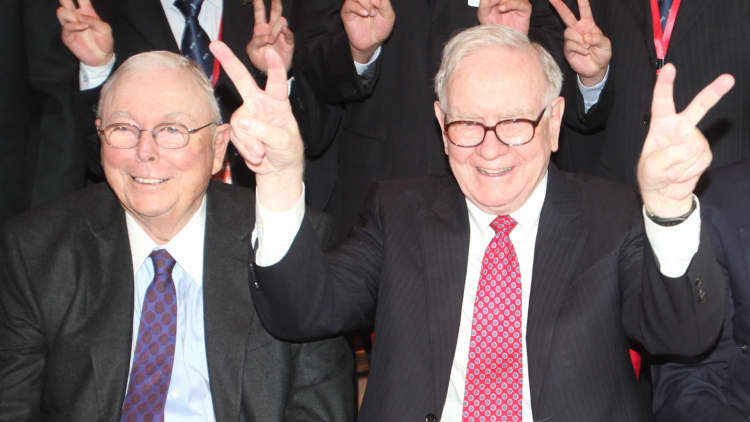Berkshire Hathaway chairman Warren Buffett, one of the most successful investors of all time, is worth an estimated $84.9 billion. And the 88-year-old is the first to admit that he wouldn't be where he is today without a bit of luck.
"The womb from which you emerge determines your fate to an enormous degree for most of the seven billion people in the world," Buffett told journalist Rebecca Jarvis in 2013. "Just in my own case: I was born in 1930, I had two sisters that have every bit the intelligence that I had, have every bit the drive, but they didn't have the same opportunities."
In short, "if I had been a female, my life would have been entirely different."
Buffett had made a similar point before. As he said at Berkshire Hathaway's Annual Shareholders Meeting in 1997, he knew he had won what he called the "ovarian lottery."
"You don't know whether you're going to be born black or white. You don't know whether you're going to be born male or female," he explained. "You don't know whether you're going to be born infirm or able-bodied. You don't know whether you're going to be born in the United States or Afghanistan."
The ovarian lottery is "the most important event in which you'll ever participate," Buffett continued. "It's going to determine way more than what school you go to, how hard you work, all kinds of things."
Research backs his claim that the circumstances you're born into strongly affect your success. Being born rich is far more helpful in life than being born gifted, the Washington Post reports: "Economists found genetic endowments are distributed almost equally among children in low-income and high-income families. Success is not."
For example, "the least-gifted children of high-income parents graduate from college at higher rates than the most-gifted children of low-income parents."
I was born in 1930, I had two sisters that have every bit the intelligence that I had, have every bit the drive, but they didn't have the same opportunities.Warren BuffettBerkshire Hathaway chairman
Buffett and his business partner Charlie Munger both won the ovarian lottery, Buffett said at the 1997 shareholders meeting, and their good fortune contributed significantly to their success.
"We won it partially in the era in which we were born by being born male," said Buffett. "When I was growing up, you know, women had — they could be teachers or secretaries or nurses, and that was about it. And 50 percent of the talent in the country was excluded from, in very large part, virtually all occupations."
Nodding to the fact that white people in America had real structural advantages in the early 20th century, he added, "We won it by being white. You know, no tribute to us, it just happened that way." When he was born, during the Great Depression, for example, much of America was still segregated, and African-Americans had an unemployment rate two to three times that of whites.
Luck granted him and Munger a sharp eye for business, too, Buffett said: "We won it in another way by being wired in a certain way, which we had nothing to do with, that happens to enable us to be good at valuing businesses. And, you know, is that the greatest talent in the world? No. It just happens to be something that pays off like crazy in this system."
In the same vein, Buffett has often talked about how grateful he is to be where he is today, and that mindset may contribute to his success: Studies show that grateful people are more likely to be happy and successful.
He's far from the only successful businessman to focus on living an appreciative life. Self-made billionaire Oprah Winfrey tracked the things she was grateful for in a "gratitude journal" for a decade. In 2014, Mark Zuckerberg challenged himself to write one thank-you note a day.
And "Shark Tank" star Robert Herjavec says that taking the time to be thankful for where you are in life is key to career success. One of the ways you know you're on the right career path, Herjavec writes, is that, "you feel good — about yourself, about your life, about all you have achieved and all the things you plan to achieve."
Don't miss: Warren Buffett on the #MeToo movement: Women 'make me optimistic about America'
Like this story? Subscribe to CNBC Make It on YouTube!




